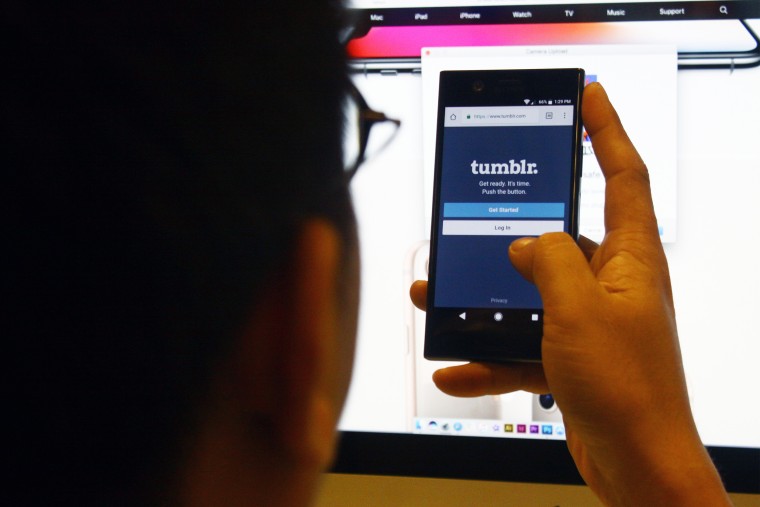The internet, as the "Avenue Q" song goes, is for porn. But for many years, anyone who fancied themselves a curator of smut had to go through the hassle of setting up hosting, or acquainting themselves with the nuances of complicated blogging software — that is, until Tumblr came along.
Since its founding in 2007, microblogging platform Tumblr has been home to a quirky collection of content. More image focused and longform-friendly than Twitter, and more anonymous and publicly accessible than Facebook, Tumblr gave rise to a diverse array of accounts, celebrating everything from the fantasy of a woke Ryan Gosling to literary-inspired tattoos — and, thanks to a historically lax attitude towards nudity and sexual content, a whole lot of porn.
There’s no question that Tumblr’s openness to adult content helped the site grow. Born in the freewheeling days of the aughts, Tumblr’s original plan was that of a “business in the front, party in the back” style of content management, one where where a clean and tidy front page created a corporate-friendly visage that obscured a wild bacchanalia of increasingly weird content uploaded by the platform’s user base.
And that dual model, where Tumblr managed to be both clean cut enough to attract Yahoo as a buyer, and raucous enough to help popularize the porn gif, worked in Tumblr’s favor for quite some time. In 2013, TechCrunch reported that a full 11.4 percent of a Tumblr’s top 200,000 sites were porn-related, and that a full 22.37 percent of sites sending traffic to Tumblr were pornographic in nature — making the adult industry the largest source of traffic to Tumblr, category-wise.
For a time, the platform openly embraced its hardcore users and fans, launching an officially sanctioned directory of explicit and erotic Tumblrs in January 2010 (a directory that was, sadly, very short-lived).
But all that is over now. This week, Tumblr, which is now owned by Verizon, announced that adult content will soon be banned from the site. Dec. 17 — which, critics have wryly noted, is also the International Day to End Violence Against Sex Workers — will reportedly be the dawn of a brand new, nudity-free era of Tumblr.
It’s hard to feel much shock at Tumblr’s decision to show porn the door: Despite its early embrace of adult content, the site has been edging towards a more conservative attitude towards sex and porn for quite some time now. After shuttering their directory of adult sites, the Tumblr team went on to hide porn results from search and tag pages in 2013; earlier this year, a porn filtering “Safe Mode” became the default way to access the site.
And, Tumblr is hardly alone in this trend. As internet use has gone from being a niche interest to an integral aspect of most people’s daily lives, the web has become vastly less friendly to the very kind of content that initially drove its growth. For instance, Patreon — like Tumblr — benefited from and then abandoned sex-focused creators; with a rise in anti-porn and anti-sex work legislation like the UK’s pending porn blocker, it’s likely that more and more web companies will come to the conclusion that the cost of doing business with adult creators is far too high to be worthwhile.
But as on trend as this move might be, it still feels like the end of an era — and, potentially, the end of Tumblr itself. Unlike competing social media giants like Twitter and Facebook, Tumblr never attracted enough of an audience to establish itself as a formidable presence or a dominant method of media and communication. And as Twitter has shifted its interface to become longer form and friendlier to images and video, and Facebook has been encouraging it users to join groups, weird memes and accounts that might once have been only found on Tumblr have started cropping on both, chipping away at Tumblr’s unique sensibility.
As the site cleans up its supposedly loose ends to become safer and more corporate-friendly, it’s difficult to see why anyone would use it going forward. After Tumblr announced its new content policy, commentators quickly took to Twitter to point out that the site was likely shooting itself in the foot; that, despite the company’s conviction that porn was a bug, and not a feature, of the platform, actual users knew better.
It wouldn’t be a shock if the move truly does herald Tumblr’s final days. When founder David Karp left the company in November 2017, commentators were already prepping their obituaries for Karp’s creation. “It’s likely only a matter of time until Verizon shutters the company and dissects it for parts,” Alyssa Bereznak wrote in the introduction to a Tumblr retrospective on The Ringer. Now that one of the core aspects of the platform’s identity is being axed, that time seems to be rapidly approaching. Without porn and other erotic art, there’s little to differentiate Tumblr from its competitors — and without that differentiation, there’s little reason to keep on using the site.


